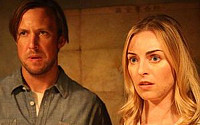| SHADOWS ON THE WALL | REVIEWS | NEWS | FESTIVAL | AWARDS | Q&A | ABOUT | TALKBACK | ||
 Shadows off the beaten path Shadows off the beaten path | ||
| Indies, foreigns, docs, revivals and shorts... | ||
|
On this page:
BORN GUILTY |
GEHENNA: WHERE DEATH LIVES THE MISANDRISTS | THE REVIVAL < < I N D I E S > > last update 6.May.18 See also: SHADOWS FILM FESTIVAL | ||
 R E V I E W B Y R I C H C L I N E
R E V I E W B Y R I C H C L I N E | ||
Born Guilty
| ||
|
dir-scr Max Heller prd Raymond Hauserman, Max Heller with Rosanna Arquette, Jay Devore, David Coussins, Keesha Sharp, Anna Lore, Jay Klaitz, Xander Berkeley, John Lavelle, Circus Szalewski, Damien Bodie, Jemal David, Ellen Clifford  release US 11.May.18
release US 11.May.1817/US 1h43 |
 Bright and broad, this comedy plays everything to the hilt, largely by keeping the female characters shrieking in panic or anger. And the men aren't much better, as each scene is cranked up to 11. There's enough smiley charm to hold the attention, and this is the kind of film that's fun to watch with a lively late-night cinema audience. But writer-director Max Heller simply pushes everything too far.
Bright and broad, this comedy plays everything to the hilt, largely by keeping the female characters shrieking in panic or anger. And the men aren't much better, as each scene is cranked up to 11. There's enough smiley charm to hold the attention, and this is the kind of film that's fun to watch with a lively late-night cinema audience. But writer-director Max Heller simply pushes everything too far.
In Manhattan, outspoken social worker Judith (Arquette) dives into the lives of strangers on the street. Which is perhaps why she's so lonely. And why her son Marty (Devore) moved to Los Angeles. Amid a barrage of ill-timed calls from her, plus pressure from high-maintenance girlfriend Leslie (Sharp), Marty's world-travelling friend Rawl (Coussins) turns up. And an idea blossoms: he hires Rawl to give his mother some attention, hoping that if she's happier she won't bother him so much. In New York, Rawl stays with Marty's agoraphobe friend Rupert (Klaitz). What could possibly go wrong? There's a shrill tone to this movie, as everyone constantly shouts at each other. Only the zenned-out Rawl keeps his cool. This makes it very difficult to sympathise with either Judith or Marty, both of whom are so tightly wound that they seem to be flailing through life, even if their hearts are in the right place. By contrast, Rawl is intelligent, cultured and open-minded enough to see the best in Judith, which almost makes their romance believable until the script throws in another contrivance. Performances are all overstated, so none of these feel like real people. There's a sense that each of these actors is trying to steal every scene, which can be a bit exhausting to watch. And writer-director Heller never lets anyone take the focal spotlight. It's great to see Arquette in a lead role, and she adds a layer of pathos to Judith that makes her endearing, but the film continually cuts away from her, leaving the character rather superficial while spending too much time with Devore's flatly ridiculous Marty. Pretty much everything about this film is over-the-top, from inappropriate conversations to the cluttered sets and goofy costumes. Just a bit of understatement might have allowed the story to come to life, because the narrative is full of twists and turns that are sweet and engaging. A few moments of honest interaction or thoughtful conversation might have grounded the entire movie. Instead, the film passes the time amiably enough, then is easily forgotten. | |
|
15 themes, language, sexuality 2.May.18
| | |
 R E V I E W B Y R I C H C L I N E
R E V I E W B Y R I C H C L I N E | ||
Gehenna: Where Death Lives

| ||
|
dir Hiroshi Katagiri prd Koodae Kim scr Bradley Palmer, Nathan Long, Hiroshi Katagiri with Justin Gordon, Eva Swan, Simon Phillips, Matthew Edward Hegstrom, Sean Sprawling, Doug Jones, Lance Henriksen, Masashi Odate, Tom Miyano, Katherine Wallace, T Jack Williams, Maxie Santillan Jr  release US 4.May.18
release US 4.May.1818/Japan 1h45
|  Even if it's super-cheesy, this Japanese-made English-language horror movie plays on the idea of ignorant Americans trampling on local treasures. With added layers from Spanish colonialism and Japanese occupation, there are some big ideas underpinning the mayhem. The filmmaker nicely uses gorgeous tropical beaches as a contrast to the cheap interior sets in which most of the action takes place. Refreshingly, much of the nastiness is achieved with costumes and makeup rather than digital trickery.
Even if it's super-cheesy, this Japanese-made English-language horror movie plays on the idea of ignorant Americans trampling on local treasures. With added layers from Spanish colonialism and Japanese occupation, there are some big ideas underpinning the mayhem. The filmmaker nicely uses gorgeous tropical beaches as a contrast to the cheap interior sets in which most of the action takes place. Refreshingly, much of the nastiness is achieved with costumes and makeup rather than digital trickery.
Paulina (Swan) arrives in Saipan on business, only to learn that the land where she's planning to build a resort is sacred to the indigenous people. With her seasoned colleague Tyler (Gordon) and naive young photographer Dave (Hegstrom), she's met by money-obsessed local contact Alan (Phillips) and scruffy driver Pepe (Sprawling). They decide to have a look into the tunnels under the property, then find themselves trapped in an ancient burial ground that seems to have been collecting bodies over the centuries. And one grizzled, almost dead old man (Jones) is very angry. Gehenna is a Hebrew word for hell, referring to the inner sanctum of this underground lair, where the curse began when an immortal spectre lost his face in the 17th century prologue. The story takes an early twist that leaves everything that happens feeling naggingly predictable. It would have helped a lot if the bewildering maze of tunnels looked less like papier-mache. Or if there was a sense of proper menace beyond each character's individually realised nightmare, enacted as fright-faces looming in the dark. There isn't much actors can do with characters this simplistic, but at least they have fun adding subtext to their interaction. Emoting is required only as each confronts his or her deepest fear, straight from a cliched fragment of back-story. Otherwise, performances centre on reacting to yet another grisly discovery before carrying on with their bickering. As in most of these movies, there's one person you want to die, two having an oddly timed romance and two hapless expendables. Clearly, director-cowriter Katagiri's primary goal is to offer up a series of icky freak-out moments loosely strung together by the whiff of a plot. So most set-pieces involve randomly nasty visual gimmicks that cleverly unnerve us, even though nothing very coherent emerges from it all. But the script puts plenty of effort into adding details to the mythology behind the curse, which at least makes intriguing use of the island's history. | |
|
15 themes, language, violence 29.Apr.18 | ||
 R E V I E W B Y R I C H C L I N E
R E V I E W B Y R I C H C L I N E | ||
The Misandrists

| ||
|
dir-scr Bruce LaBruce prd Paula Alamillo, Jurgen Bruning, Sonja Klumper, Bruce LaBruce with Susanne Sachsse, Viva Ruiz, Kita Updike, Lo-Fi Cherry, Olivia Kundisch, Til Schindler, Victoire Laly, Serenity Rosa, Sam Dye, Kembra Pfahler, Caprice Crawford, Dominik Hermanns  release Ger 2.Nov.17,
release Ger 2.Nov.17, UK 30.Apr.18, US 25.May.18 17/Germany 1h31 
|  Canadian filmmaker Bruce LaBruce continues to blur politics and sexuality with this fetishistic drama about a group of man-hating women plotting to overthrow the patriarchy. Each scene is infused with a twisted sense of humour that provokes both nervous laughter and jagged controversy. So while the film has a rather wacky story and style, it is underscored with some seriously relevant issues.
Canadian filmmaker Bruce LaBruce continues to blur politics and sexuality with this fetishistic drama about a group of man-hating women plotting to overthrow the patriarchy. Each scene is infused with a twisted sense of humour that provokes both nervous laughter and jagged controversy. So while the film has a rather wacky story and style, it is underscored with some seriously relevant issues.
Somewhere in Ger(wo)many, injured young soldier Volker (Schindler) emerges from the woods and encounters two young women, Isolde and Hilde (Updike and Kundisch), who hide him in their basement to recover. The problem is they they are part of an isolated school for misandrists ruled by the imperious Big Mother (Sachsse), who would be furious to know a man was in the house. Over the next few days Ute (Laly) learns of Volker's presence, and a new plan to fund their cult-like lifestyle may force Isolde to reveal her own very personal secret. LaBruce gives the film an oddly timeless quality, clearly set in present day but with a wartime tone that spirals into something almost mythological. In their tattered country mansion, these women are encouraged to indulge in free-love liaisons with their sisters in arms, study extreme gay porn and discuss philosophy. And most of these young women had horrific experiences being abused by men before they were rescued by Big Mother. So their reactions to Big Mother's harsher ideas create conflicting emotions. Would the world really be much better without any men? Performances are stylised, camping it up in the style of a 1970s lesbian melodrama. Although the political subject matter adds odd layers of grit underneath the archness. Each woman has a distinct personality, combining acts of rebellion with fun-loving wackiness, like an epic slo-mo pillow fight or juvenile misbehaviour during Sister Kembra's (Pfahler) lecture on parthenogenesis, reproduction without the need for males. As the narrative develops, Isolde's journey becomes the most engaging one. Where the overall story goes is fairly outrageous, especially as the script challenges ideas of binary gender as it heads into anarchy. As usual, LaBruce creates a distinctly fantastical world, then challenges the audience by leading us audience into seriously disturbing territory. A sequence that uses footage from actual surgeries is very difficult to watch. And the ideas are pungent and unflinching. So while the film's messages about violence and oppression are completely jumbled, at least this is a story that encourages freedom of thought. | |
|
18 themes, language, violence, sexuality 28.Apr.18
| | |
 R E V I E W B Y R I C H C L I N E
R E V I E W B Y R I C H C L I N E | ||
The Revival
| ||
|
dir Jennifer Gerber scr Samuel Brett Williams prd Sophie Finkelstein with David Rysdahl, Zachary Booth, Raymond McAnally, Lucy Faust, Stephen Ellis, Kathleen Suit, Josh Williams, Vivian Norman, David Carl  release US 19.Jan.18,
release US 19.Jan.18, UK Mar.18 flare 17/US 1h25 
|  Adapted by Samuel Brett Williams from his own stage play, this drama is sharply well written and played, with knowing observations about the collision between religion and culture. When the plot kicks in for the final act, the film's honesty begins to feel contrived, badly muddying its message in a series of scenes that may ring true but say all the wrong things about the topics at hand.
Adapted by Samuel Brett Williams from his own stage play, this drama is sharply well written and played, with knowing observations about the collision between religion and culture. When the plot kicks in for the final act, the film's honesty begins to feel contrived, badly muddying its message in a series of scenes that may ring true but say all the wrong things about the topics at hand.
After studying at Harvard, Eli (Rysdahl) returns with his pregnant wife June (Faust) to take over his late father's church in Arkansas, hoping to open the minds of his parishioners. Although the lively Trevor (McAnally) takes him hunting to convince him to adapt his message to the "I love Jayzus!" attitude of the locals. Then drifter Daniel (Booth) turns up, and Eli lets him crash in his parents' old cabin. But there's a spark of chemistry between them, and now Eli has a secret he's hiding as he tries to win over his small congregation. The film's thoughtful tone is over-serious, so it sometimes feels preachy. Still, there are honest, moving moments as Eli confronts feelings he has battled all his life. As the big revival meeting approaches, Eli struggles with this internal tension, making decisions that don't feel logical. He's far too smart to let this much war rage between his heart, soul and mind. He should know that the pressures he is feeling are false ones, and that the fanatical church is the problem, not the solution. The actors have earthy authenticity. Rysdahl is superb as this nervy young man realising that his life is opening up in ways he never wanted it to. Although for a Harvard-educated preacher, he's far too easily manipulated. Booth gives Daniel an edgy charm that makes their scenes together realistically awkward and engaging. So their clashes feel genuine, as do their deeper feelings. The supporting cast has less to do. McAnally is kind of a one-note meathead, while Faust has a couple of strong but over-egged scenes. As in I Am Michael, which unlike this was based on a true story, this film takes a controversial approach to religion and sexuality that will be hard to take for audiences that need to be told who's right and who's wrong. But director Gerber hedges key scenes, and the script ducks its central point, instead taking some melodramatic turns. But at least there are much subtler themes at work here that audience has to grapple with. | |
|
15 themes, language, sexuality, violence 3.Feb.18 | ||


See also: SHADOWS FILM FESTIVAL © 2018 by Rich Cline, Shadows
on the Wall
| ||